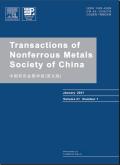Microstructural evolution and hot tensile behavior of Mg-3Zn-0.5Zr alloy subjected to multi-pass friction stir processing
IF 4.7
1区 材料科学
Q1 METALLURGY & METALLURGICAL ENGINEERING
Transactions of Nonferrous Metals Society of China
Pub Date : 2024-11-01
DOI:10.1016/S1003-6326(24)66629-X
引用次数: 0
Abstract
The microstructures and hot tensile behaviors of ZK30 alloys subjected to single- and multi-pass friction stir processing (FSP) were systematically investigated. Following single-pass FSP (S-FSP), coarse grains underwent refinement to 1-2 μm, with a distinct basal texture emerging in the stir zone (SZ). Additionally, second-phase particles were fragmented, dispersed, and partially dissolved. Multi-pass FSP (M-FSP) further enhanced the homogeneity of the microstructure, reduced texture intensity differences, and decreased the fraction of second-phase particles by 50%. Both S-FSP and M-FSP SZs demonstrated superplasticity at strain rates below 1×10-3 s-1 and at temperatures of 250-350 °C. The S-FSP SZ exhibited an elongation of 390% at 250 °C and 1×10-4 s-1, while the M-FSP SZ achieved an elongation of 406% at 350 °C and 1×10-3 s-1. The superplastic deformation of SZ was co-dominated by grain boundary sliding (GBS) and the solute-drag mechanism in S-FSP and mainly by GBS in M-FSP.
求助全文
约1分钟内获得全文
求助全文
来源期刊
CiteScore
7.40
自引率
17.80%
发文量
8456
审稿时长
3.6 months
期刊介绍:
The Transactions of Nonferrous Metals Society of China (Trans. Nonferrous Met. Soc. China), founded in 1991 and sponsored by The Nonferrous Metals Society of China, is published monthly now and mainly contains reports of original research which reflect the new progresses in the field of nonferrous metals science and technology, including mineral processing, extraction metallurgy, metallic materials and heat treatments, metal working, physical metallurgy, powder metallurgy, with the emphasis on fundamental science. It is the unique preeminent publication in English for scientists, engineers, under/post-graduates on the field of nonferrous metals industry. This journal is covered by many famous abstract/index systems and databases such as SCI Expanded, Ei Compendex Plus, INSPEC, CA, METADEX, AJ and JICST.

 求助内容:
求助内容: 应助结果提醒方式:
应助结果提醒方式:


